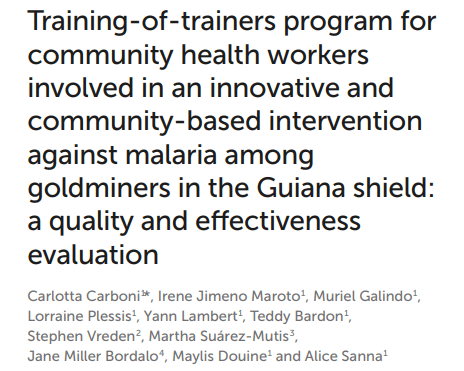This study assesses the quality and effectiveness of the training program set up for the facilitators in the CUREMA project.
Read the article here !
Abstract
Introduction: An innovative and community-based intervention is implemented in the Guiana Shield to eliminate malaria among people involved in artisanal and small-scale gold mining. The intervention consists of the distribution of malaria self-management kits to goldminers and the presumptive treatment for individuals at risk of carrying Plasmodium vivax hypnozoites. The intervention is possible owing to community health workers (CHWs) who are previously trained to master all intervention procedures, including health education activities and goldmining training. This study aimed to evaluate the training program provided to CHWs in terms of quality and effectiveness.
Methods: A training-of-trainers program for CHWs has been developed based on the CDC framework. A mixed-method case study was implemented in two steps between February and March 2023. The evaluation was based on a knowledge survey, satisfaction test, observations, and semi-structured interviews. Quantitative and qualitative data were analyzed and triangulated.
Results: A total of 20 CHWs participated in the training and the first-step evaluation. For the second step, four semi-structured interviews were conducted. The Qualitative data showed that group dynamics and adaptations were central elements of a high-quality training program. Quantitative analysis found that CHWs’ satisfaction was elevated (> 4/5 overall), especially regarding format and learning results. Improvements in knowledge level demonstrated good effectiveness (pre-training vs. post-training, p < 0.05). Nevertheless, some difficulties persisted regarding tasks of the intervention procedure, such as informed consent and smartphone application procedures (with an inaccuracy rate of 29.2% and 16.7%, respectively). Further on-the-job training permitted to address these issues. The project team’s previous experience and the Guiana Shield countries’ commitment to the WHO-E-2025-initiative were identified as levers for the quality of the training, while the complexity of the project context was a challenge.
Discussion: High-quality, effective, and appropriate training programs are required for effective and sustainable interventions involving CHW profiles. Training design is a crucial point to address to accomplish quality and effectiveness. The training-of-trainers model has been shown to allow a high level of satisfaction, good learning results, and satisfactory implementation in the field. Initial and continuing training is an indispensable continuum to sustain good practices in the field and CHWs’ motivation. Training evaluation permits standardizing methods and facilitates transferability.

